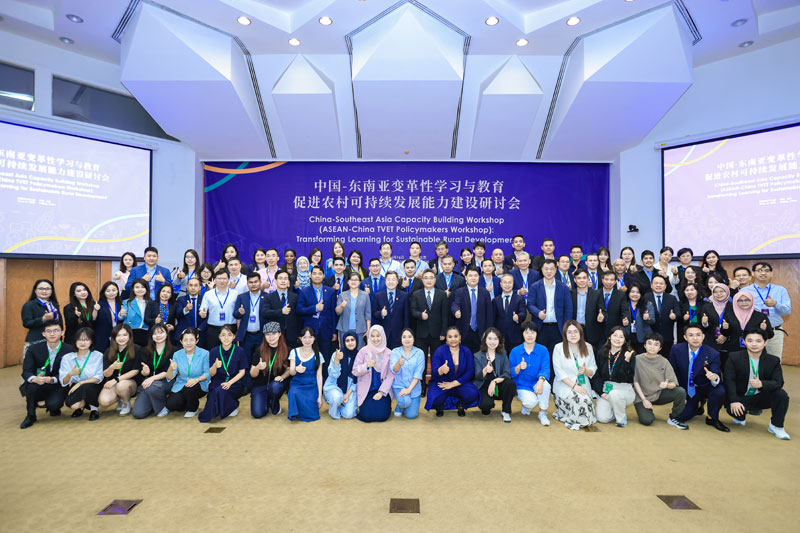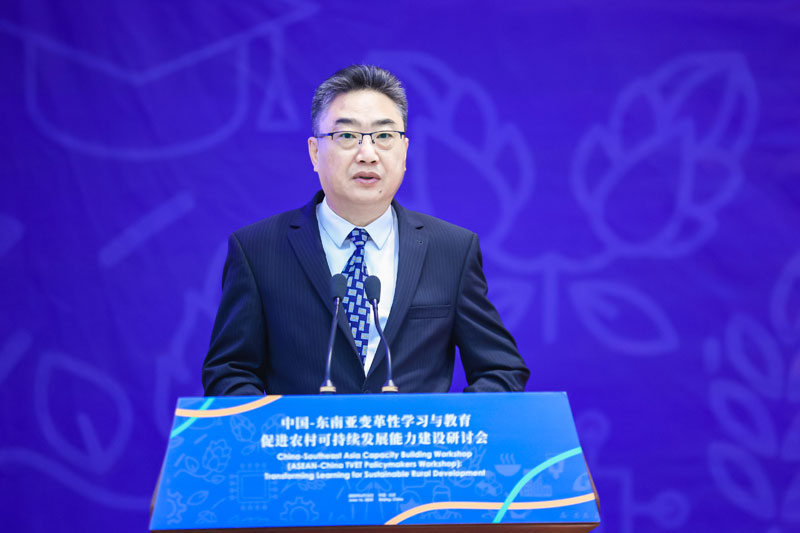
On 16 June 2025, the China-Southeast Asia Capacity Building Workshop (ASEAN-China TVET Policymakers Workshop): Transforming Learning for Sustainable Rural Development was held in Beijing. This workshop was jointly organized by the UNESCO International Research and Training Centre for Rural Education (UNESCO-INRULED), the ASEAN-China Centre (ACC), the SEAMEO Regional Centre for Technical Education Development (SEAMEO TED), and the UNESCO Regional Office for East Asia (UNESCO Beijing). The workshop attracted over a hundred policymakers, administrators, and experts from China and eight ASEAN countries in the fields of vocational and adult education. Shi Zhongjun, Secretary General of the ACC; Zhou Zuoyu, Vice Chairman of Beijing Normal University Council, Director of UNESCO INRULED; and An Yan, Deputy Secretary-General of the China Education Association for International Exchange (CEAIE), attended and delivered speeches at the opening ceremony. Shahbaz Khan, Director of the UNESCO Regional Office for East Asia, delivered a video speech. Deputy Director-General Li Yingli of the Department of Vocational and Adult Education, Ministry of Education of the People’s Republic of China, presented the keynote speech at the opening ceremony.

Shi Zhongjun stated that the China-ASEAN Comprehensive Strategic Partnership has continued to deepen and develop in recent years, yielding fruitful results in areas of political mutual trust, economic and trade development, and people-to-people exchanges. China-ASEAN vocational education cooperation has also demonstrated unprecedented potential and broad prospects for cooperation. The recently concluded 46th ASEAN Summit adopted the ASEAN Community Vision 2045, which emphasizes strengthening cross-border educational cooperation, enhancing the quality, competitiveness, and resilience of ASEAN human resources through technical training, lifelong learning and skills development and building a human resources framework that meets the needs of industrial upgrading in the digital age. Shi Zhongjun pointed out that the workshop brought together TVET policymakers and administrators from ASEAN countries, providing an important platform for policy exchange, capacity building and regional collaboration, thereby laying a solid foundation for future cooperation. He stated that the ACC considers vocational education a priority area in educational cooperation and will continue to promote policy dialogue, resource integration, and multi-party collaboration in TVET sector, so as to deepen practical cooperation, support regional socio-economic development and promote mutual understanding and affinity between peoples.

Zhou Zuoyu stated that adult education, vocational education and lifelong learning are key enablers in advancing transformative learning and education for sustainable rural development. He expressed hope that through this workshop, participants would share experience, build consensus, promote the development of cooperation networks, and contribute wisdom and strength towards achieving the United Nations 2030 Agenda for Sustainable Development (SDGs). An Yan pointed out that the workshop focuses on critical issues in rural education and development, leveraging the power of education to stimulate the endogenous dynamics of rural development. She emphasized that this is bound to further advance the building of a China-ASEAN vocational education community. Shahbaz Khan stated that the workshop theme is highly aligned with UNESCO’s strategic priorities and the United Nations 2030 Agenda for Sustainable Development. He expressed commitment to working with all participants to continuously build a bridge between policy research and practice. In his keynote speech, Li Yingli systematically presented to attendees the experience, achievements, and future development goals of China’s vocational education in recent years. He advocated for China and ASEAN countries to continuously strengthen intergovernmental dialogue and pragmatic cooperation, deepen teacher exchange and training, and jointly cultivate highly skilled talents with international competence.
This five-day workshop aims to, through diversified formats including policy sharing, participant discussions and field visits to vocational institutions, share the achievements and innovative practices of China and ASEAN countries in promoting rural revitalization and economic and social development through vocational education, adult education and lifelong learning. It seeks to foster mutual learning and coordinated development between both sides, provide replicable solutions for cultivating skilled talents regionally and globally and for rural education and development, thereby contributing to building a more inclusive and sustainable society.